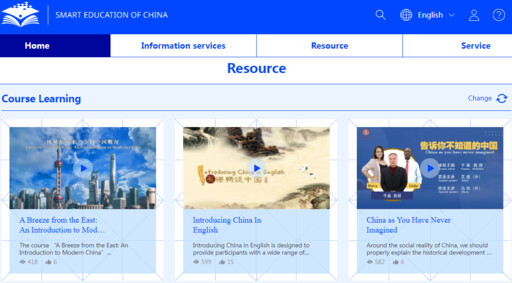


Digital education must prioritize security, human development, equity

FILE PHOTO: The Smart Education of China is an educational service platform established by the Ministry of Education’s Center for Educational Technology and Resource Development.
As an integral part of educational modernization, digital education offers numerous new opportunities for the education sector, yet it is equally important to recognize that digital technology is not a panacea for all challenges in education. In advancing digital education, careful attention must be paid to the ethics of technology to guard against risks such as privacy breaches, the alienation of education, and widening educational inequality.
Ensuring digital security and ethics
Data mining and intelligent decision-making have become key tools in the modern educational system. They enable precise, multidimensional, and real-time analysis of teachers, learners, and educational processes and content, significantly supporting personalized, self-directed, and lifelong learning. Yet the extensive application of digital technology has also given rise to pervasive monitoring of educational activities, as if an invisible “eye” were constantly “watching” participants. For example, real-time tracking of teachers’ instructional performance and students’ facial expressions and movements during class could be used to evaluate comprehension and learning outcomes.
Such practices have been criticized for undermining the agency of teachers and students, and potentially encouraging performative behavior that distorts genuine teaching and learning feedback. This panopticon-style surveillance may also result in arbitrary data collection, excessive or improper use, and even illegal acquisition or trade of educational data. Because such data often involves personal privacy, its leakage or malicious use can infringe upon citizens’ dignity and personal security, while posing serious risks to the stability and credibility of the educational system.
Halting digitalization to avoid security risks is clearly undesirable. Instead, proactive measures should be adopted to regulate how digital technology is applied in education. Teachers must strengthen their understanding of data security and ethics, enhance digital literacy, and remain alert to the risks of digital education. Educational institutions and edtech providers must ensure that data collection, processing, and use comply with relevant laws and regulations, thereby preventing the leakage or misuse of sensitive information.
Upholding a people-centered philosophy
While digital education offers unprecedented possibilities, it may also reinforce the belief that digital tools could fully replace human teachers, which risks alienating both education and individuals. The ultimate goal of education is to foster human development, which should remain the benchmark of successful digital education. Technology, as a tool, ought to complement, enhance, and extend teachers’ capabilities rather than replace them. If education is treated as fully digitizable and the agency of real individuals is neglected, students may struggle to develop genuine autonomy and healthy emotional lives, ultimately straying from the mission of education.
A pressing issue in the education sector is striking a balance between digital technology and the essence of education, thereby establishing a people-centered digital education system. Educators should uphold the integration of technology with the humanistic spirit, design applications that embody concern for people and provide emotional experiences, and strengthen intellectual and emotional exchanges with students while imparting knowledge. Students, for their part, should use digital tools wisely to enhance learning efficiency and actively cultivate critical thinking, creativity, and collaborative skills.
Sharing the benefits of digital education
Digital technology has contributed greatly to narrowing disparities among regions, between urban and rural areas, and across schools. In recent years, China has expanded access to high-quality resources through initiatives such as the “Smart Education of China” platform, the “MOOC Westward Expansion Program 2.0,” and pilot projects for digital volunteer teaching. However, widespread application of digital technology does not automatically eliminate the digital divide; in some cases, it may even exacerbate inequality.
Although schools in some remote or less developed areas now have basic digital infrastructure, persistent gaps remain compared with leading regions in terms of hardware, the quality of resources, and the digital literacy of teachers and students. In certain cases, teachers lack the skills or initiative to make full use of digital resources, and digital learning is reduced to students watching live or recorded classes without in-depth engagement activities. This can render digital education formalistic, failing to spark curiosity, creativity, or a sense of collaboration.
Safeguarding the rights of digitally disadvantaged groups is crucial to achieving digital justice in education. National policies should increase investment in underdeveloped regions and schools to bridge infrastructure and resource gaps. Teacher training can boost digital literacy and digital teaching skills, while digital technology can empower the upgrading of the quality of instruction. Moreover, socially responsible edtech companies should focus on developing low-cost, efficient, and widely accessible tools to benefit rural and impoverished areas.
Wang Xu is a professor from the School of Marxism at Shandong Jianzhu University.
Editor:Yu Hui
Copyright©2023 CSSN All Rights Reserved